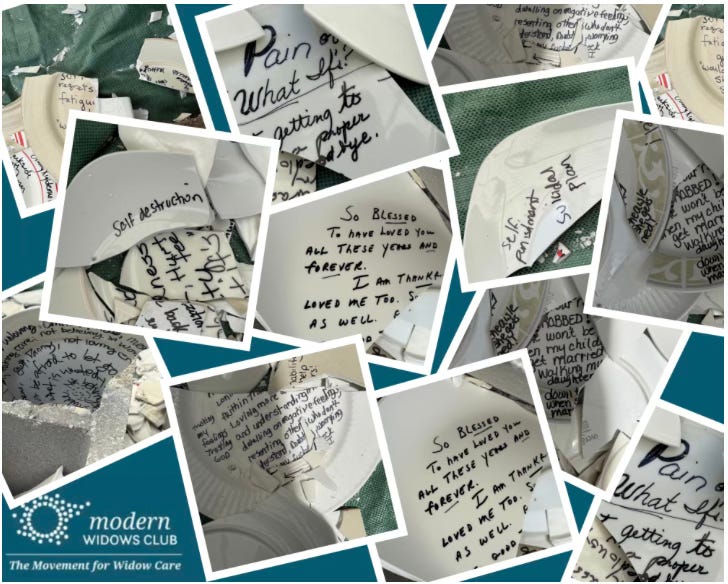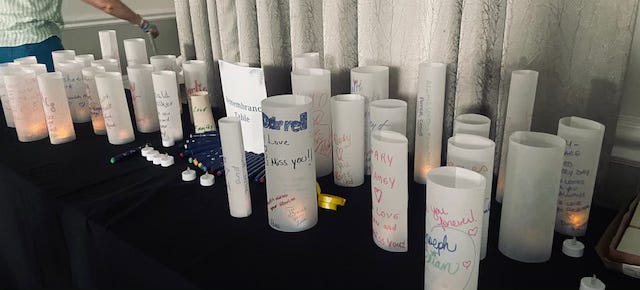Promise Made, Promise Kept: Honoring America's Widows
In a culture obsessed with relationship failures, we're overlooking the women who embody our deepest values about love, commitment, and devotion.
Margaret sits in her kitchen every morning at 6:47 AM—the same time she used to pour coffee for two. For forty-three years, she honored the promise she made on a June afternoon in 1979: "for better, for worse, for richer, for poorer, in sickness and in health, until death do us part."
Death did part them. But her promise? That remains beautifully unbroken.
Margaret is one of America's 15 million widows—women who represent the ultimate fulfillment of the marriage vows our society claims to cherish. Yet in our national conversations about family values, these remarkable women remain conspicuously absent.
We analyze divorce statistics, celebrate milestone anniversaries on IG, celebrity weddings abroad and debate the state of modern commitment. But we rarely pause to honor the women who kept their promises all the way to the natural end.
It's time we changed that narrative.
The Quiet Champions of Lasting Love
When we speak about commitment and family values, we often deal in abstractions. But American (and global) widows are the living embodiment of these ideals—women who didn't just promise "till death do us part," they lived it with grace, determination, and unwavering love.
These women stayed. Through unexpected job losses and frightening health diagnoses, through the exhausting years of raising children and the tender years of caring for aging parents, through countless ordinary Tuesdays and treasured Sunday mornings. They chose love when it was effortless and when it demanded everything they had.
Consider this profound truth: while the average marriage that ends in divorce lasts about eight years, the average American widow was married for thirty-two years when her husband died. These aren't women who walked away when life got complicated—these are women who redefined resilience and kept building something beautiful together.
The Sacred Journey from "I Do" to "Until We Meet Again"
Every widow's story is fundamentally a completed love story—not because the love ended, either suddenly for any reason or over a long diagnosis, but because one precious life did.
In our culture of renewable relationships and flexible commitments, widows represent something profound: the fulfillment of a sacred promise.
Think about the extraordinary journey these couples traveled together:
The Dreaming Years: Young marriages filled with hope, first apartments decorated with more love than money, careers just beginning, and the breathless excitement of early love deepening into something unshakeable. For some, widowhood happened in these years.
The Building Years: Children arrived, transforming everything. Love learned new languages—expressed through midnight feedings, soccer game cheers, college savings accounts, and the thousand small sacrifices that create family. For some, widowhood happened in these years.
The Testing Years: Life delivered its inevitable challenges—job losses, health scares, financial strain, family crises. Love proved itself not in grand romantic gestures but in the simple act of showing up, day after day, choice after faithful choice. For some, widowhood happened in these years.
The Flowering Years: As children grew and launched their own lives, couples either grew apart or discovered they'd cultivated something magnificent together. Widows are the gardeners who tended their marriages into full bloom. For some, widowhood happened in these years.
The Sacred Years: When illness came—and it almost always does—these women transformed into caregivers, advocates, gentle nurses, and fierce protectors. While statistics show that many marriages struggle with "in sickness and in health," these women lived it with extraordinary grace. For some, widowhood happened in these years.
This is what fulfilled marriage vows look like. Not perfect marriages—perfection doesn't exist—but completed ones, honored until the very end.
Redefining What Marriage Success Really Means
Our culture has an incomplete understanding of marital success. We celebrate golden anniversaries, but rarely acknowledge the couples who would have reached fifty years if death hadn't intervened. We measure success by duration alone, overlooking the deeper measure of faithfulness.
Widows represent a different kind of victory—not the fairy tale "happily ever after," but something more complex and beautiful: "faithfully ever after." They didn't receive the ending they wanted, but they received the ending their promises prepared them for.
In a nation where nearly half of marriages end in divorce, widows stand as living proof that lifelong commitment isn't just an ideal—it's happening every day, in hospital rooms and quiet kitchens, in suburban homes and rural communities across America.
The Remarkable Strength Behind the Sorrow
What becomes clear when you spend time with American widows is not their brokenness—though grief is real and valid—but their extraordinary strength. These are women who faced life's ultimate test and emerged with their character and integrity beautifully intact.
They've mastered lessons about love that our culture desperately needs to learn:
Love is an action, not just an emotion. When feelings fluctuated with stress and seasons, they chose to love anyway. When early romance evolved into comfortable companionship, they discovered the profound beauty of consistency. When passion transformed into deep friendship, they cherished what they'd built together.
True commitment creates freedom, not restriction. Knowing they were "all in" for life freed them to be vulnerable, to invest everything, to build something lasting. They didn't exhaust themselves wondering about alternatives—they poured their energy into nurturing what they had.
Small sacrifices create great love. Every act of putting partnership first—staying up with sick children, supporting others and their own career moves, caring for difficult relatives on both sides, choosing "we" over "me"—wove them closer together and created shared purpose.
Growth happens together or it doesn't happen at all. They became experts in the lost arts of productive conflict resolution, quick forgiveness, and changing together rather than growing apart.
The Unrecognized Heroism of Faithful Caregiving
Perhaps nowhere is the strength of American widows more evident than in their marriages' final chapters—the caregiving years that tested every promise they'd ever made.
These women learned medical terminology they never wanted to master. They became insurance claim experts and medication schedule managers. They fought fiercely in hospital corridors and spoke tenderly in darkened bedrooms. They held hands through chemotherapy and held hope through despair.
They didn't just promise "in sickness and in health"—they delivered on it with stunning grace. While research shows that serious illness strains many marriages to the breaking point, widows are the women who stayed, who cared, who loved through the hardest chapters.
They are living proof that wedding vows aren't just beautiful poetry—they're life blueprints for love that endures anything.
Learning from the Women Who Got It Right
In our ongoing conversations about strengthening families and supporting marriage, we should be turning to the women who succeeded—not because their marriages were without struggle, but because their commitment was unwavering.
American (and global) widows deserve recognition not just as grieving women needing sympathy, but as accomplished women who've earned our deepest respect. They are the graduates of lifelong love's university, holding advanced degrees in partnership, embodying exactly what our culture claims to value: the family values of a lasting, faithful commitment.
When we seek role models for young couples, let's include the widow next door who was married forty-five years.When we discuss what makes marriages thrive, let's ask the women who made theirs flourish until the very end. When we celebrate family values, let's celebrate the families they built and the promises they honored.
The Promise That Continues
Here's something beautiful about American widows: for many, the promise transcends death itself. They carry their husbands' memories with honor, their shared values with pride, and their love with profound gratitude. They often speak of "my spouse" in present tense because love this deep doesn't recognize past tense.
“They're not trapped in yesterday—they're living with the past beautifully woven into their present.” - Carolyn Moor
They understand that authentic love doesn't die when people do; it transforms. And that transformation is its own form of faithfulness.
Watch a widow tend her husband's favorite garden or speak proudly of his accomplishments to new friends. Notice how she continues wearing her wedding ring or creates a remembrance votive or keeps his photograph in a place of honor. These aren't signs of being unable to move forward—these are signs of promises kept extending beyond their original timeline.
A Beautiful Challenge to Our Culture
American widows gently challenge our society's casual approach to commitment. In a world of prenuptial agreements and no-fault divorces, they represent the radical notion that some promises are sacred and meant to be kept regardless of circumstances.
They also challenge our tendency to overlook older women or assume their meaningful lives ended with their husbands' deaths. These aren't women waiting to exist again—these are women whose lives were transformed by having loved completely and well.
Their wisdom about partnership, resilience, and deep love is exactly what our culture needs. Their example of faithful commitment is exactly what young couples should witness. Their stories of kept promises are exactly what our conversations about family values have been missing.
The Honor They've Earned
Margaret still occasionally sets the table for two, not from confusion but from the beautiful habit of forty-three years spent caring for someone else. When she notices, she doesn't feel foolish—she feels proud.
She kept her promise. Through better and worse, richer and poorer, sickness and health, until death gently parted them. As I’ve shared before, “Women of fulfilled marriage vows; Promise made, promise kept, promise honored” with grace.
She embodies American family values at their finest—not because she avoided the challenges that end other marriages, but because she faced those challenges with unshakeable commitment and emerged with her integrity and love beautifully intact.
It's time we recognized American widows not simply as women who lost their spouses, but as women who succeeded magnificently at marriage. They are champions of commitment, living proof that promises can be kept and love can last through anything life brings.
In a culture searching for authentic examples of lasting love, we need look no further than the widow in our neighborhood who still says "we" when making decisions alone, who feels married in her heart, who continues honoring promises made decades ago. Even if she decides to re-partner or re-companion in the future, she will always be the widow of the one she kept a completed promise to.
Promise made. Promise kept. Promise honored.
These are our heroes of the heart, the keepers of love's deepest truths, and it's time we celebrated them as the extraordinary women they are and give them the freedom to live with dignity and honor.
Enjoy your Independence holiday this weekend.
-Carolyn Moor
Widow Life™ presented in partnership with New York Life Foundation. “Meeting life’s challenges with life-changing support”











Thank you for this article that helps me to understand that as a widow I have more worth and value than I realized.
thank you for the empowering chapters. I was married 49 years when my husband passed with many issues and pain. But i would do it again and keep taking care of him.... Celine Marshall